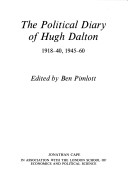'I didn't know the bugger kept a diary like that,' said Herbert Morrison. It was just as well. Few people get off lightly in this iconoclastic tour of British politics in the mid-twentieth century. Hugh Dalton was an insider outsider, an Old Etotnian who used the Labour Party as a vehicle for the pursuit of both his ambitions and the causes in which he believed. Tories considered him a class traitor. Bloomsbury intellectuals found him vulgar. Even on the Labour side, he caused unease. Beatrice Webb saw 'in his colourless face...a terrace of cunning.' Yet, as she also observed, an appearance of careerism was partly a pose. He had high principles and courage. He left his mark. Elected to Parliament in 91924, Dalton became a Foreign Office Minister in the second Labour government. Having lost his seat in 1931, he travelled to Russia, Germany and Italy (where he met Mussolini). Following his re-election in 1935, he fought successfully to persuade the Labour party to oppose appeasement and abandon its hostility to rearmament.
After serving in Churchill's wartime Coalition (an episode described in The Second World War Diary of Hugh Dalton 1940-45, also published by Jonathan Cape), he was placed at the Treasury in the post-war Atlee administration. Here he became the most Socialist Chancellor of the Exchequer ever to have held office, inspiring the Government's most radical schemes. In November 1947 an accidental Budget leak forced his resignation.Later, in a final phase as elder statesman, he sought in vain to arbitrate between Left and Right in the Labour Party Civil War of the 1950s. This volume of Dalton's unpublished diary starts with the author's return from active service in the First World War. It ends with Dalton's final retirement, during controversies in the Labour Party over Clause Four and nuclear disarmament. The account it provides of the years in between, up to 1940 and after 1945, is historically unique. For much of the period, no other prominent Labour politician was writing a diary. By turns conceited, opinionated, sentimental, acid, shrewd, funny, irreverent, generous, this is a work to raise hackles. Persons of irascible disposition are warned against it.
Heroes and villains include Winston Churchill, Neville Chamberlain, Ramsay MacDonald, Arthur Henderson, Sir Oswald Moseley, Clement Attlee, Sir Stafford Cripps, Ernest Bevin, Emanuel Shinwell, Anthony Eden, Harold Macmillan, Aneurin Bevan, Hugh Gaitskell, Harold Wilson and Anthony Crosland. The book contains an introduction, linking passages and notes by the editor.
- ISBN10 0224019120
- ISBN13 9780224019125
- Publish Date January 1987
- Publish Status Out of Print
- Out of Print 12 February 1993
- Publish Country GB
- Publisher Vintage Publishing
- Imprint Jonathan Cape Ltd
- Format Hardcover
- Pages 832
- Language English
